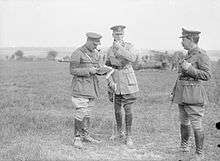Hamilton Reed
| Hamilton Reed | |
|---|---|
 Group portrait including Hamilton Lyster Reed (centre) | |
| Born |
23 May 1869 Dublin, Ireland |
| Died |
7 March 1931 (aged 61) South Kensington, London |
| Buried | East Sheen Cemetery |
| Allegiance |
|
| Service/ |
|
| Years of service | 1888 - 1919 |
| Rank | Major General |
| Unit | Royal Artillery |
| Commands held | 15th (Scottish) Infantry Division |
| Battles/wars |
Second Boer War First World War |
| Awards |
Order of the Bath Order of St Michael and St George Croix de Guerre (France) |
| Relations |
Sir Andrew Reed (father) Harry Hammon Lyster VC (uncle) |
Major General Hamilton Lyster Reed, VC, CB, CMG, (23 May 1869 – 7 March 1931) was an Irish British Army officer, and recipient of the Victoria Cross, the highest and most prestigious award for gallantry in the face of the enemy that can be awarded to British and Commonwealth forces.
Early life
Born in Dublin, he was a grandson of Hamilton Lyster, and a son of Sir Andrew Reed, a distinguished police official. He was educated at the Royal Military Academy, Woolwich, and was gazetted into the Royal Field Artillery as a second lieutenant on 17 February 1888.
Military career
Reed was promoted to lieutenant on 17 February 1891, and to captain on 14 September 1898.[1] Following the outbreak of the Second Boer War in late 1899, he went to South Africa for active service.[2] He took part in the Ladysmith Relief Force, including the Battle of Colenso on 15 December 1899, where he was wounded.
Details on Victoria Cross
He was 30 years old, and a captain in 7th Battery, Royal Field Artillery during the battle of Colenso on 15 December 1899. The detachments serving the guns of the 14th and 66th Batteries, Royal Field Artillery, had all been either killed, wounded, or driven from their guns by Infantry fire at close range, and the guns were deserted. His citation mentions the following deed, for which he was awarded the VC:
Captain Reed, who had heard of the difficulty, shortly afterwards brought down three teams from hiss battery to see if he could be of any use. He was wounded, as were five of the thirteen men who rode with him, one was killed; and thirteen out of twenty-one horses were killed before he got half-way to the guns, and he was obliged to retire.[3]
Second Boer War
After the end of regular warfare, the war turned into a guerrilla war in late 1900. During the later part of the war, he served as a Staff Officer, in the position of Deputy Assistant Adjutant-General from 12 June 1901.[4]
The War ended in June 1902, with the Treaty of Vereeniging. Reed left Cape Town in the SS Dilwara in late July, and arrived in Southampton the following month.[5] He was stationed with the 145th Battery at Woolwich.
Further military service
Reed later achieved the rank of Major general and served in the First World War.
He died in London on 7 March 1931.
Family
His son Andrew was killed in the Battle of France whilst serving with the RAF[6]
The Medal
His Medal is part of the Lord Ashcroft collection.[7]
References
- ↑ Hart′s Army list, 1903
- ↑ "Anglo Boer War.com". Retrieved 17 January 2013.
- ↑ "No. 27160". The London Gazette. 2 February 1900. p. 689.
- ↑ "No. 27311". The London Gazette. 7 May 1901. p. 3128.
- ↑ "The Army in South Africa - Return of troops". The Times (36845). London. 13 August 1902. p. 5.
- ↑ CWGC entry
- ↑ "Lord Ashcroft VC Collection". Retrieved 15 January 2013.
- The Register of the Victoria Cross (1981, 1988 and 1997)
- Clarke, Brian D. H. (1986). "A register of awards to Irish-born officers and men". The Irish Sword. XVI (64): 185–287.
- Ireland's VCs ISBN 1-899243-00-3 (Dept of Economic Development, 1995)
- Monuments to Courage (David Harvey, 1999)
- Irish Winners of the Victoria Cross (Richard Doherty & David Truesdale, 2000)